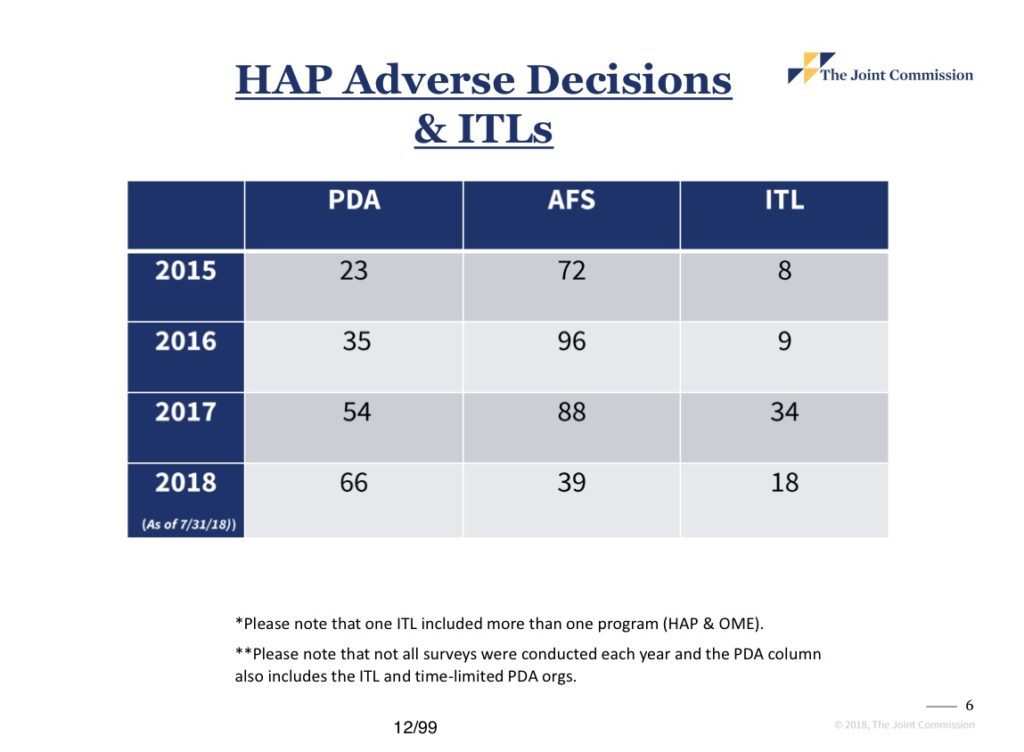You just received the TJC survey report for your hospital. You have two Condition-Level Deficiencies, and you’re getting a follow-up survey in 45 days. Of course, you’ll develop your Joing Commission corrective action plans and implement the needed fixes. But your leadership is asking how your results compare with other hospitals. So, let’s take a look at the data shared by TJC COO, Mark Pelletier, at our recent Consultants Forum meeting at Joint Commission headquarters.
Condition Level-Deficiencies
It’s clear from the data that Condition-Level Deficiencies are on the rise for hospitals. A Condition-Level Deficiency means non-compliance with a CMS Condition of Participation. The result is a Medicare Deficiency Follow-up Survey by TJC within 45 days.
Percent of Hospitals With at least One Condition-Level Deficiency
- 2016: 32%
- 2017: 49%
- January – June 2018: 52%
Percent of Hospitals with Adverse Decisions
(Preliminary Denial of Accreditation, Accreditation with Follow-up Survey, and Immediate Threat to Life)

Why the significant increase in Condition-Level Deficiencies and adverse decisions? A large part of the answer is that TJC is surveying more closely than ever to the CMS CoPs. As an accrediting organization with deemed status, TJC must show their survey results are consistent with CMS validation survey results. (CMS does a 5% annual sample.)
Standards Driving TJC Survey Adverse Findings
Once again, the data tells the story. Problems with disinfection and sterilization of medical equipment are a key contributor to adverse findings for hospitals. The majority of these issues occur in settings such as emergency rooms, operating rooms, and dental suites. However, the emphasis on cleaning of medical equipment and supplies has spread to psychiatric hospitals, and RFIs are on the uptick in these settings as well. (See our recent post, Joint Commission Surveys: High-Risk Areas.)
Case in point: we worked with one psychiatric hospital that had an Immediate Threat to Life decision and a Preliminary Denial of Accreditation due to inadequate disinfection of instruments by the contracted podiatrist. This resulted in numerous plans of correction and follow-up surveys before it was ultimately resolved.
Condition-Level Deficiencies for Psychiatric Hospitals
Although Condition-Level Deficiencies for infection control are on the rise, the most common Condition-Level Deficiencies for psychiatric hospitals are for ligature risks and Special Medical Records Requirements for Psychiatric Hospitals. The challenges in these areas are well known, and we’ve covered them in several articles over the last year, such as:
- Guidance from TJC Regarding Ligature Risks
- Update on Surveying of Ligature Risks
- Survey Findings Related to Ligature Risks
- Tips for Documenting the Mental Status Exam
- Closed Medical Records Reviews: TJC Survey Feedback
Average Number of Requirements for Improvement (RFIs) for Hospitals
For the period from June 1, 2017, to May 31, 2018, the average number of RFIs for hospitals was 32. So, if your leadership is looking for comparisons, review your SAFER matrix and see how you compare with that average. It’s not necessarily apples to apples but it does give some context.
How does this relate to ongoing Joint Commission survey readiness? As the saying goes, “Forewarned is forearmed.” When preparing for your next TJC survey, focus your efforts on these high-risk trends. You’ll avoid the predictable findings, the lengthy plans of correction, and the dreaded follow-up surveys. What a welcome outcome! Also, be sure to stay tuned to TJC news alerts such as the new 411 on Survey Enhancements.


